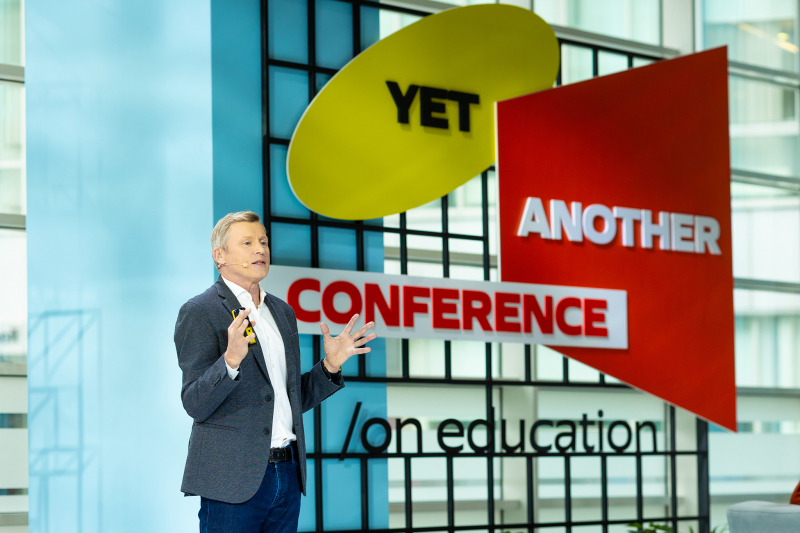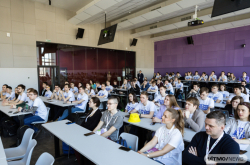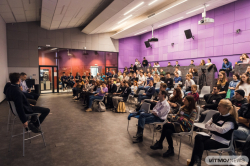One of the main challenges for both companies and universities today is the shortage of specialists. According to various estimates, there is currently a need for at least a million IT professionals in Russia alone. And, as Daria Kozlova noted during the event’s opening, the demand is not just for “regular” IT specialists, but specifically those who possess an all-new skill set and can operate at the intersection of fields. Some, for instance, must also be knowledgeable in medicine and know how to apply IT solutions in that field. The competition, thus, is shifting towards interdisciplinary expertise. So, where can these specialists be found and how are they trained?
One obvious solution for companies is to boost university collaborations and expand in-house educational programs. The speakers discussed what that looks like today and how the process can be made even more effective.

Daria Kozlova. Credit: Yandex. / yace.yandex.ru
Why businesses need universities
Major IT companies have started working with universities more often – and that’s a global trend. For instance, ITMO is currently offering a whole slate of corporate educational programs developed jointly with Sberbank, Yandex, VK, and Napoleon IT. The university and its partners also work together to conduct competitions and hackathons for school and university students.
Read also:
It would seem that businesses are pursuing purely utilitarian goals – to train the right kind of specialists and make it easier to expand their human resources. But is that the only reason for companies to go into education?
According to Anna Stepanova, the deputy VP for educational projects at VK, if a company gets involved in education, it must be aware of its responsibility before its audience – that is the foundation of a strong brand. At the moment, VK not only continues to expand its collaborations with universities and academic programs, but also adds new services to its non-commercial VK Education platform. Recently, the company launched a special project for school students. It also conducts career guidance events, tests, competitions, and hackathons.
“The responsibility that a business takes on when going into education means that there is more to it than simply training specialists and providing them with employment. The ability to hire staff is, if anything, an awesome consequence of the funnel that is formed by all our activities. Educational responsibility is about guiding school and university students on their way and being a part of these processes. Whenever possible, of course,” commented Anna Stepanova.
Another example of social responsibility among educational brands is their ability to contribute to the development of geographical regions. According to Olga Tsukanova, the executive director of Sberbank's Academic Partnerships Directorate, the company actively participates in regional development programs. Recently, Sberbank opened a representative office at the Far Eastern University and launched an educational program in entrepreneurship. At the same time, she notes, the project’s aim isn’t to draw graduates to Moscow, but to train those who will grow within their own region.
Not competition, but more opportunities: why companies need their own universities
In recent years, the flourishing online courses of EdTech and IT companies have made many question the need for higher education. However, corporations are now going further and launching not just courses, but entire universities. For example, in 2023 the Russian bank Tinkoff opened its Central University and welcomed the first Master’s students to programs in analytics, machine learning, and product management. Next year, the university will open its doors to Bachelor’s students. Why does a major company need a full-scale educational institution?
According to Ivan Stelmakh, the CPO of Central University, Tinkoff doesn’t aim to create competition for universities, but to offer more opportunities to proactive school and university students who didn’t pass the rigorous selection process of the country’s top universities:
“We have spotted a serious gap: the number of talented students is more than the number of those who can enroll in a top university. I myself got 260 points on my Unified State Exam (USE) – and that isn’t enough to get into a truly high-quality program. There are other indicators of talent than USE and we rely on them to select students and offer educational grants. We strive to offer opportunities to those who didn’t score the highest USE points, no matter the reason.”

Credit: Yandex. / yace.yandex.ru
What can “classical” universities do in such conditions?
Those students who crave to acquire a specific skill set for future employment can get what they need from an online course. At university, students receive training in more than just practical skills and all potential employers understand this, believes Andrey Volkov, the head of Social Strategy Institute of Skolkovo Moscow School of Management and the scientific supervisor of the national program Priority 2030. Fundamental education, overall literacy, general knowledge, critical and abstract thinking, soft skills — these are beyond the scope of corporations. At the same time, it is the lack of such general education that may hinder one's career path.
According to Andrey Volkov, active engagement of corporations in the educational process is not a threat. It does mean, however, that universities need to revise their educational objectives.
“Business won’t teach students everything; it only solves a business task — bring a trainee up to speed so that they start bringing added value. Companies don’t have to equip trainees with fundamental knowledge or critical thinking skills – that’s a job for universities. That’s why I don’t see this as a threat but rather a positive trend. However, if universities keep focusing on training experts for specific niches, they will lose this race,” added Andrey Volkov.
Customers or partners: an ideal relationship between a company and a university
What does a perfect mutually beneficial partnership look like, then? Speakers at the conference agreed that while a few years ago collaborations between companies and universities resembled customer-contractor relations, this is a disappearing practice now. The more such collaborations develop, the clearer do businesses understand academic processes and the psychology of lecturers. This understanding gives partners the opportunity to synchronize on various levels, including management teams:
“On the one hand, we try to share what we know in the broad sense. At Sberbank, we have the Digital Summer School for lecturers and this year it welcomed 1,600 participants. We have also developed a better understanding of the work of management teams and now trust them with strategic and operational solutions,” added Olga Tsukanova.

Credit: Yandex. / yace.yandex.ru
Andrey Volkov concludes: the relations between businesses and universities have to transition towards something more formalized – to reach the level of a board of directors. Universities in other parts of the world, China to name one example, have already started adopting such practices. Such “boards of directors” don’t interfere in a university’s operational processes but develop joint strategies and make key decisions concerning knowledge and technologies.
Read also:
Yet another Conference (YAC/e) is a major online conference about people and tech in education organized by Yandex. This year, the event included several sections: for parents, school and university teachers, university administrators, and EdTech companies. You can watch the recorded talks and discussions on Yandex’s YouTube channel (in Russian).






